On July 16, 2020, students from the Belt & Road Initiative (BRI) Executive MBA Program joined in remotely for the Five-year Anniversary Student Forum on “Business Innovation and BRI Opportunities in the Post-Covid World,” one of the series of events held to commemorate the fifth anniversary of the program. Kan Cai, Associate Director of the Center for Finance EMBA at Tsinghua PBCSF, opened the forum. Teck Yong Heng, student of the Tsinghua PBCSF BRI EMBA Program and Managing Partner of C-Squared Partners, moderated the session.
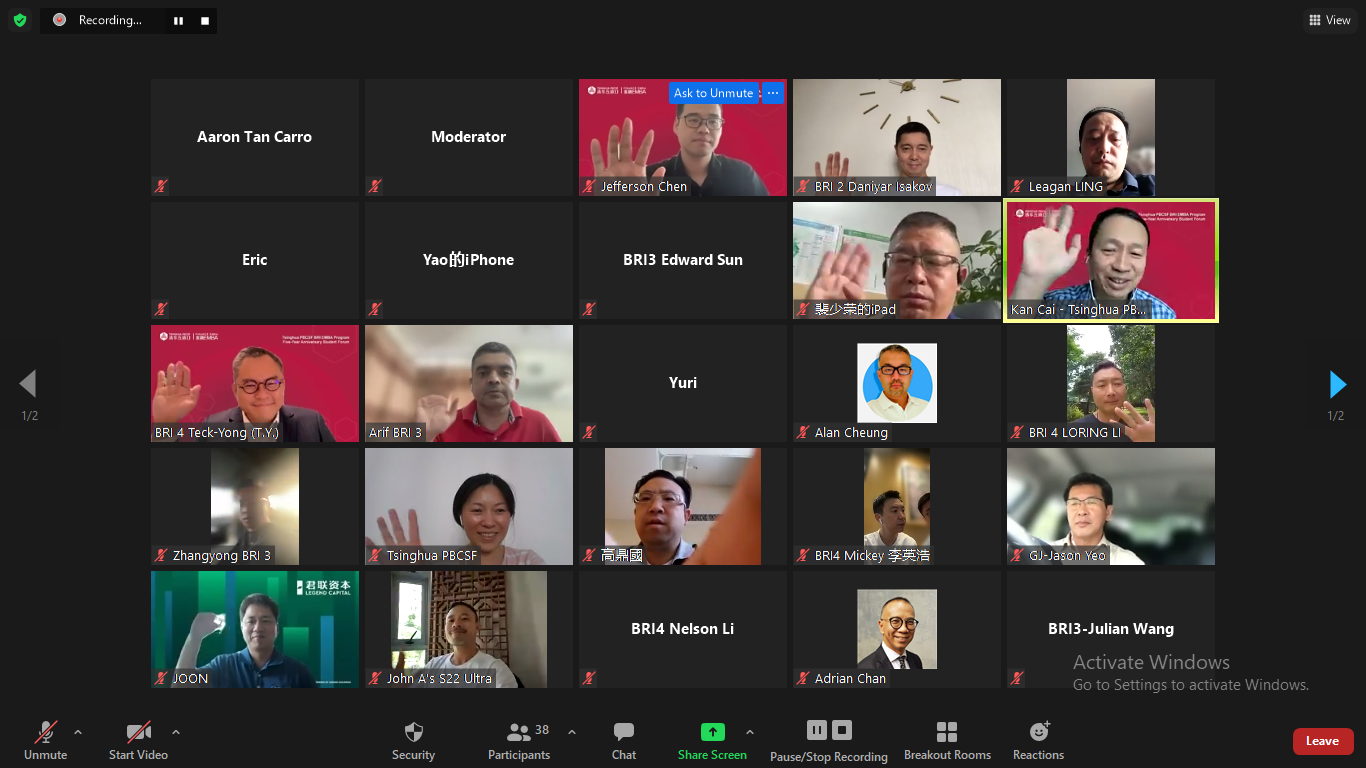
Students gather for the Five-year Anniversary Student Forum virtually
Five years have passed since the program launched with the first cohort of 58 students. It was with determination, trust and confidence the students put on the program and the drive and diligence the program staff demonstrated that the program came to life and achieved spectacular success. Since May of 2017, the program has enrolled 4 cohorts of over 200 students from 24 countries and regions all over the world, while the 5th cohort is shaping up.
Although the pandemic has put up some significant hurdles, the program still managed to overcome them and carry on the BRI flag. None of this would have materialized without the support from the vision and foresight from the leaders of Tsinghua University and the top management of Tsinghua PBCSF.
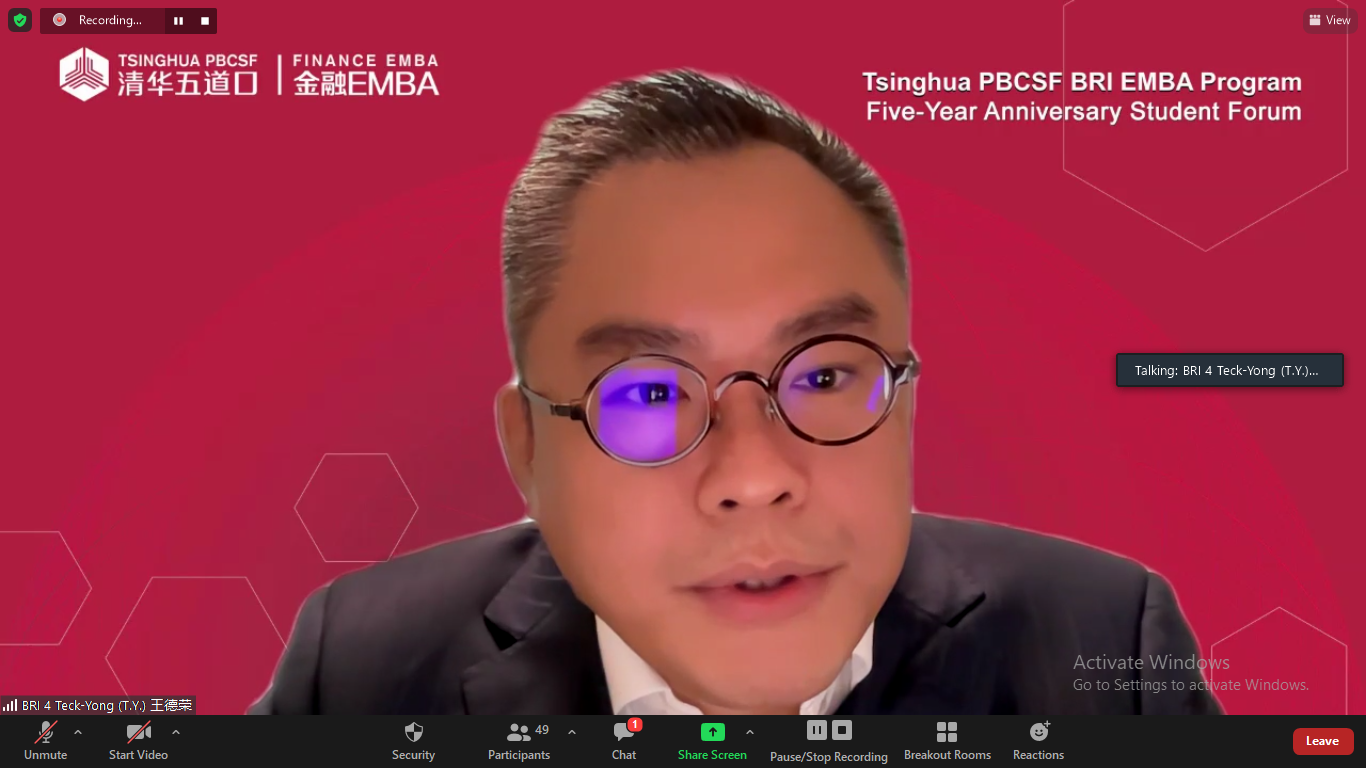
Teck Yong Heng, Managing Partner of C-Squared Partners, moderating the session
With a complete shift in business paradigm which tossed up the business logic and changed the rules fundamentally after the prolonged Covid pandemic, a few of the frontrunning leaders of the new economy in innovative industries from the BRI EMBA student body were invited to share their insights on their respective fields and enlighten with their expertise.
Aaron Tan, Co-founder and CEO of Carro, Southeast Asia’s largest online marketplace for cars, Jefferson Chen, Co-founder and CEO of Advance Intelligence, a leading Fintech and artificial intelligence company that operates in more than 15 countries globally, and Arif Chowdhury, Co-founder and Board Member of Transsion, a leading provider of mobile phones in emerging markets, each delivered a brief introduction on their respective companies and personal experiences, before coming together for a panel discussion on the theme of “Business Innovation and BRI Opportunities in the Post-Covid World.”
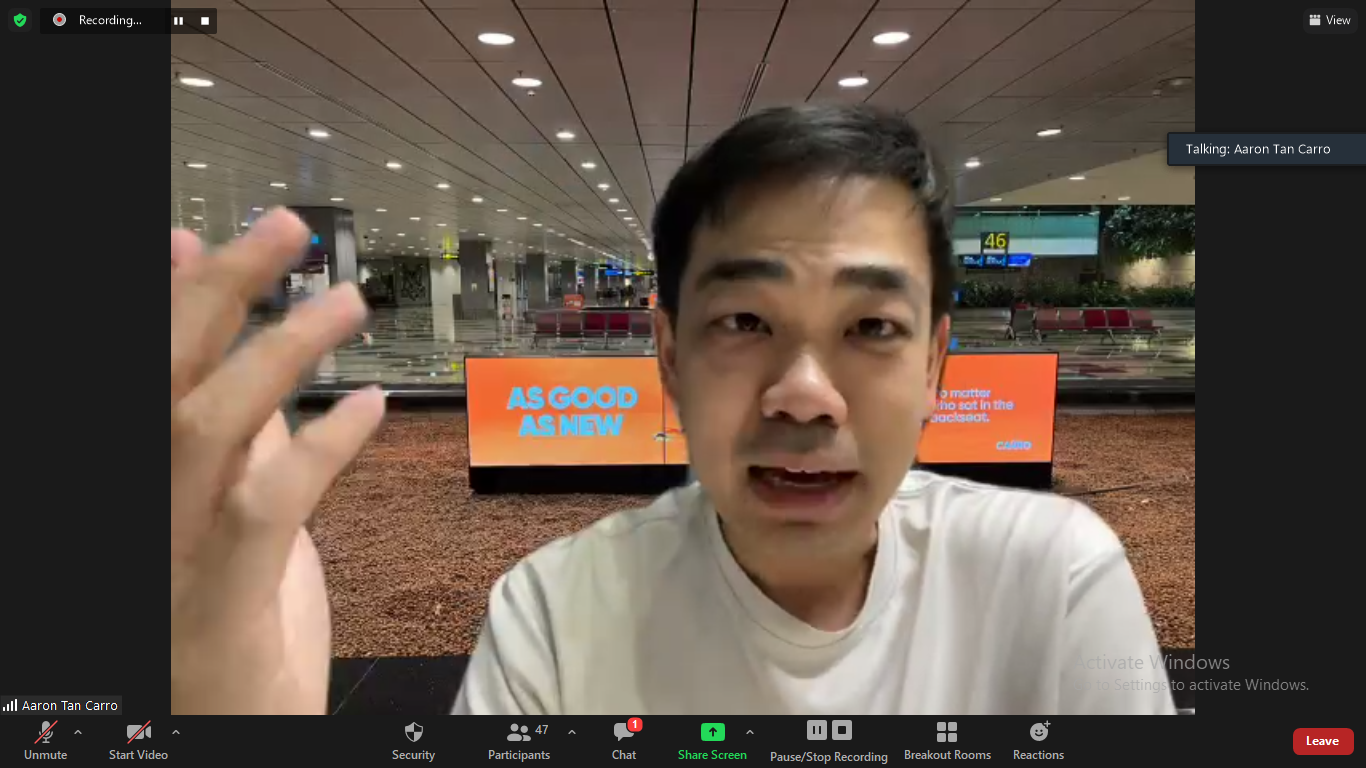
Aaron Tan, Co-founder and CEO of Carro
Aaron Tan, a Singapore native, had already been a computer whiz at the age of 13, when he developed a pay-per-click search engine. He represented Singapore in international programming competitions, and eventually went to Carnegie Mellon University to pursue a degree in computer science, where he also met his future Carro mates. After leaving Innov8 after nearly five years, he launched Carro with a team of like-minded individuals in October 2015.
One of Singapore’s latest unicorns, Carro offers services for all facets of car ownership, including purchasing and selling as well as financing options and post-sale assistance. In 2021, Carro raised almost half a billion dollars. The company has a regional footprint that covers Singapore, Malaysia, Indonesia and Thailand, employing more than 1,000 people across the four countries.
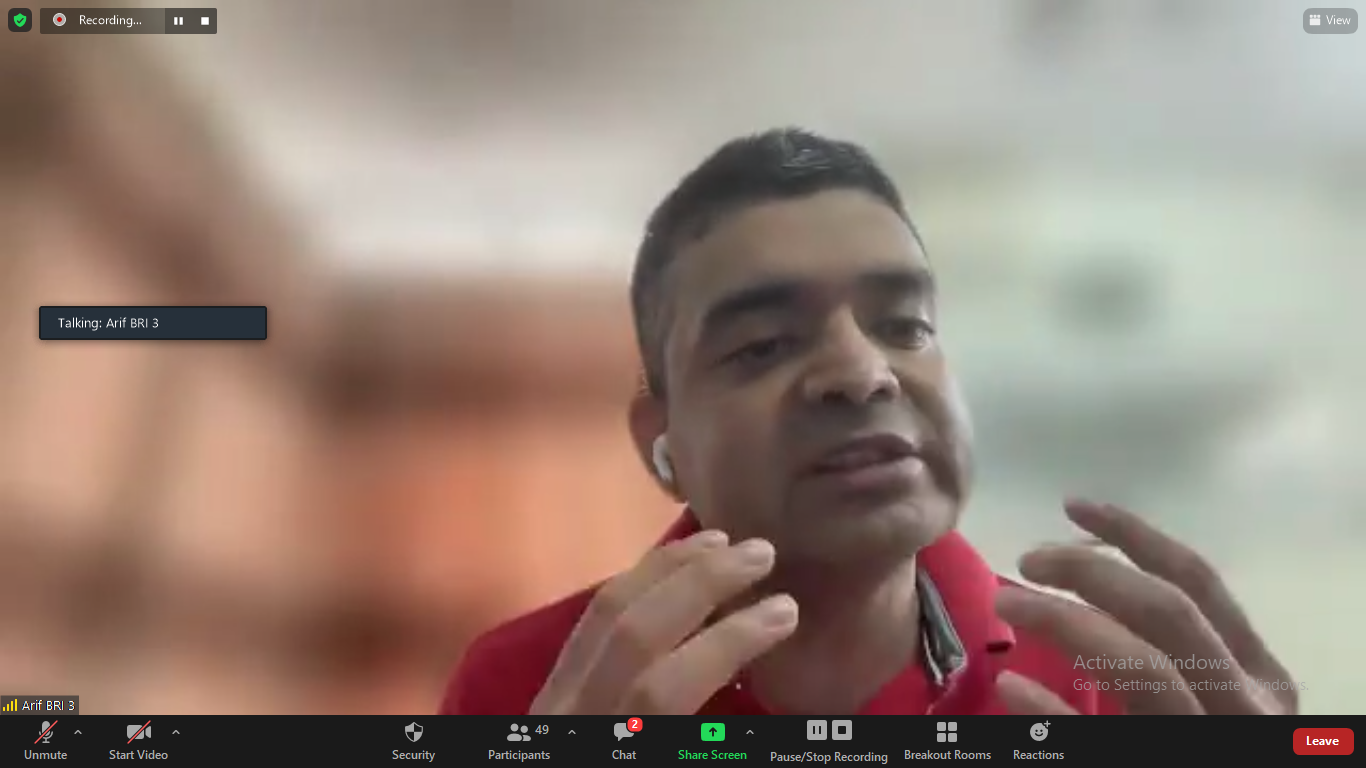
Arif Chowdhury, Co-founder and Board Member of Transsion
Following his graduation from the top high school in Dhaka in 1999, Bangladesh-born Arif Chowdhury made the decision to pursue his studies abroad. Arif's peers at the time tended to study abroad in affluent nations like the United States and Australia, but he was interested in China. He traveled alone to Shanghai, China, where he enrolled at Tongji University to study computer science. Arif joined a Chinese mobile phone firm after earning his college degree.
Founded in July 2006, Transsion is a Chinese high-tech business with a focus on the R&D, creation, distribution, and support of mobile communication devices. After years of growth, it has established itself as a significant player in the global mobile phone market and one of the leading producers of mobile devices, with a total market cap of 10 billion USD. The company has established offices in numerous nations and locations, including Dubai, Nigeria, Kenya, Tanzania, Cameroon, Bengal, and Ethiopia.
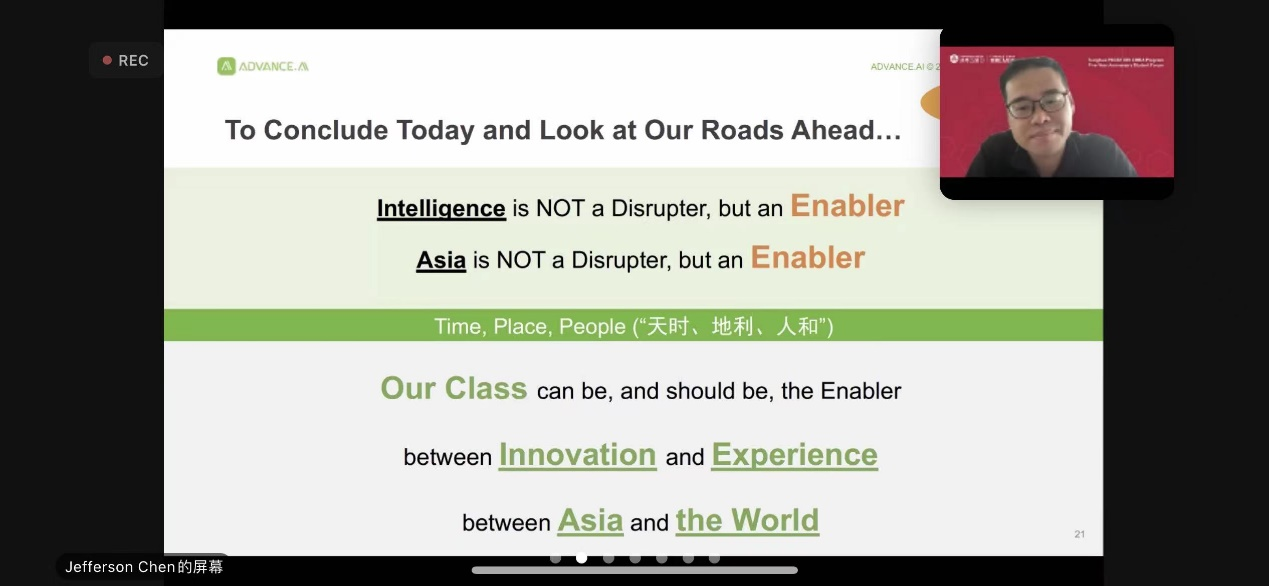
Jefferson Chen, Co-founder and CEO of Advance Intelligence
For the past 20 years, Jefferson Chen’s life has been centered around technology and finance, between China and Southeast Asia. Jefferson is a Partner at GSR Ventures, a leading venture capital firm in China focused on early-stage technology firms. He was head of private investing for Greater China at Farallon Capital and Senior Analyst at Goldman Sachs where he executed IPO and M&A transactions for many Asian companies. He holds an MBA from Stanford University and a bachelor's degree in Computer Science from Tsinghua University.
Headquartered in Singapore, Advance Intelligence Group is an Al-driven technology company. Today, it is a Series D-backed company with presence across 17 markets: Singapore, Indonesia, Philippines, Hong Kong, Malaysia, Vietnam, Mainland China, India, Thailand, Taiwan, Mexico, Pakistan, Colombia, Nigeria, Egypt, Japan, Ghana.
Managing a workforce with cultural differences across Belt and Road countries
The most crucial thing, according to Arif, while entering a new area with a completely different culture is to avoid saying or doing anything that would leave a bad impression. Nigeria, a nation with a 50/50 Christian/Muslim split, is home to Transsion's largest market, so one area where extra caution should be exercised is religion. Nigerians also have a different concept of time, which Arif cited as another cultural difference. He remarked, "Now doesn't mean now, but now now now does." Arif also highlighted some of the differences in lifestyle and communication between East and West Africa that he noticed whilst working there.
There are now about 20 separate regional offices for Jefferson's business. According to Jefferson, the first step should be to determine what needs to be standardized and centralized most. For his company, it was language. Although English is the organization's official language, staff are encouraged to speak locally in their respective offices in their preferred language to increase productivity. By establishing committees and language training programs, management further demonstrated its commitment to diversity and inclusion. "We need to demonstrate to the people that we genuinely care about their nation and culture from the top leadership down.”
Aaron expressed that for internal expansion, it is always important to know what can be centralized and standardized. For his company, he noted the tradeoffs between centralization and decentralization. Pointing to the varying understanding of work/life balance across different cultures as an important issue for his business, Aaron also concluded by saying that it’s crucial to structure the incentives properly, and more importantly, to find the right local people in the local markets to execute your plans and vision. “Centralize the right operations so that you don't deal with too many variables,” he said.
Entering a new market in a new location
Transsion began in Kenya and Nigeria when it first landed on the African continent. Arif offered three suggestions for entering a whole new market. First, start by positioning yourself as the partner's profit solution provider. Second, underline how easy it is to assist your partners in generating long-term wealth. Third, your regional partners ought to be true friends with whom you can discuss all of your ideas.
Jefferson talked about two possibilities for breaking into a new market. The first situation is when there isn't much existing business to draw upon. During this time, the founder must be present on the ground for at least the first 12 to 18 months. The second situation is when there are already some business connections that can be used to gain additional market share. Jefferson recommended quickly testing these markets and using real market feedback to help determine what the priorities are.
Aaron stressed that in his organization's experience, when it comes to entering a new market, he typically sends a top corporate executive who is conversant in both the local language and the market. After a brief assessment of the new surroundings by the executive, the company's HRBP would arrive and assume the majority of the remaining responsibilities.
The innovation edge compared to peers across the entire industry
Arif said that there are two ways to innovation. One is you create something, and the other is you see what people need and you bring what’s needed to them. He gave examples of the dual-sim technology as well as developing better AI photography for darker skin tones. These steps help the locals understand that the company cares for them and innovates new products to help them.
Aaron talked about Carro's unwavering focus on financial services and AI. Because it relies more on machines than on people, Carro's cost structure is significantly cheaper than that of its industry competitors. The extent of damage in a car crash, for example, may be promptly determined utilizing technologies like computer vision that use machine learning. The business focuses on financial services as well, handling its own credit, insurance, and licensing operations.
Jefferson talked about two cases. The first is that Advance Intelligence has successfully managed to establish itself as one of the credit bureaus in several nations. This is so because local traditional credit bureaus typically obtain their information from central banks, which results in a delay in processing and out-of-date data. Another example is the absence of a national ID database in several of the nations, which presents significant KYC issues (know your customer). This is where Jefferson’s company can step in with its facial recognition, OCR, and other technologies to screen out information and conduct cross-examination.
Since its inception in May 2017, the BRI EMBA Program has attracted more than 200 high-level enterprise decision-makers from 24 countries and regions, including Singapore, Indonesia, Malaysia, Thailand, the United States, Canada, Kyrgyzstan, Kazakhstan. A number of students from Southeast Asian Countries hold Tan Sri, Dato' Sri, Dato’, Tengku and other honorary titles. Nearly 40% of the students graduated from world-renowned universities such as MIT, Stanford, Harvard, Yale, Cornell, Oxford, Cambridge and Imperial College London.